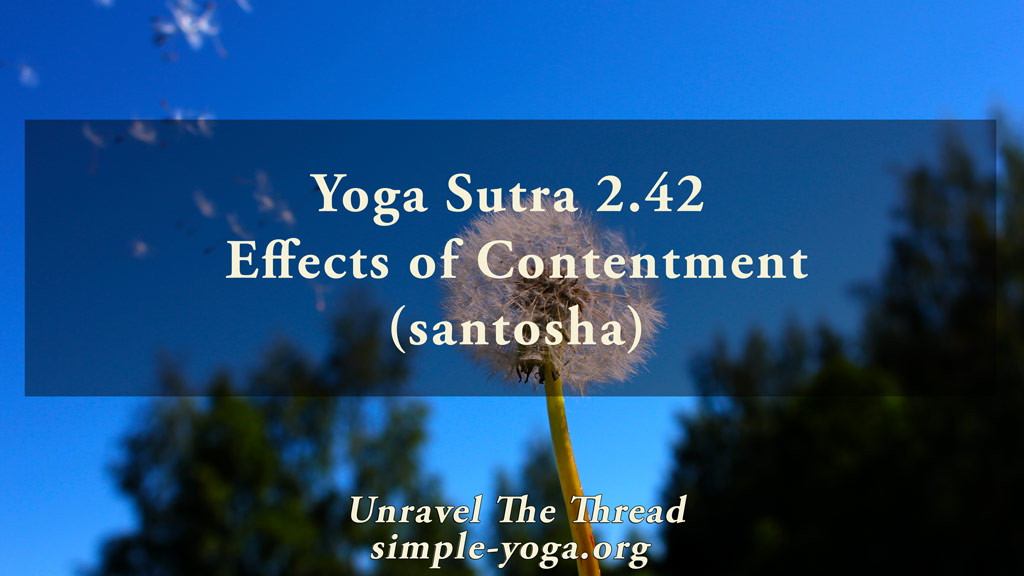
2.41 Effects of clarity II (shaucha)
January 25, 2021
2.43 Effects of enthusiasm (tapas)
February 10, 2021
2.41 Effects of clarity II (shaucha)
January 25, 2021
2.43 Effects of enthusiasm (tapas)
February 10, 20212.42 Effects of contenment (santosha)

2.42 By cultivating contentment and inner peace (santosha), supreme joy unfolds.
When you ask yourself if you live in contentment, what do you find? Sometimes you may start the day with the firm intention to invite the peace and calmness from your yoga practice into the rest of your day. However, sometimes it may seem that your intention may have invited the opposite. For instance, somebody cuts you off in traffic, someone you know says something to you that you find offensive, or you are confronted by something you have been trying to avoid. Your intention to embody peace and contentment is a sign of commitment to living in wisdom. As a result, you get feedback that helps you test your commitment. Sometimes, your ease and calm may be challenged by what you encounter. Rather than interpreting this as a sign of failure, recognize that you are being set up to let go completely of the reasons you create for not being content. Creating contentment from within is a smart and very practical choice. Thinking that contentment comes from outside will lead you to try to manipulate the world around you to avoid anything that goes against your preferences. This latter option is not only impractical, it is exhausting and, frankly, impossible to achieve. As suggested before, you can nurture your contentment by becoming aware of your complaints, both explicit and veiled, so that you can remove their causes. You may also contemplate if there is a relationship between your expectations and your ability to feel content. Another viable way of promoting contentment is by exploring how your judgments and opinions may reveal the internal filters that cause dissatisfaction.
What happens if you ponder the fact that every single situation and experience is the result of countless factors and elements coming together in a specific way that is perfectly calibrated just for you and nobody else?
Are all these things coming together to annoy you, or are they a lesson to help you release attitudes and beliefs that no longer serve you?
What needs to happen for you to find joy deep within?
As usual, one more way of exploring the meaning of this sutra is by chanting it.
You can choose to chant it in its traditional form with some of the words coming together:
2.42 saṃtoṣātanuttamassukhalābhaḥ
संतोषातनुत्तमस्सुखलाभः ॥४२॥
Another option is to chant each word in the sutra individually:
- saṃtoṣāt
- anuttama
- sukha
- lābhaḥ
If you prefer, you may listen to the podcast:
Unravel the thread is now available as a book!
If you find Simple-Yoga.org and Unravel the thread useful, consider supporting my labor with a donation, you may also donate using PayPal or Venmo. Thank you!
